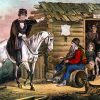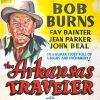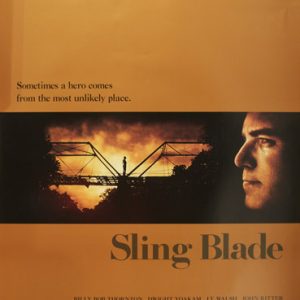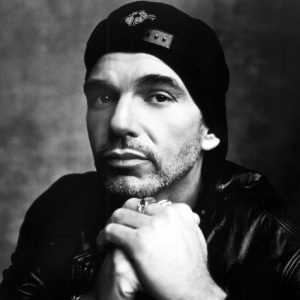calsfoundation@cals.org
Sling Blade
Filmed entirely in Benton (Saline County) by Arkansas native Billy Bob Thornton, Sling Blade was one of the most critically acclaimed movies of 1996 and earned Thornton—who wrote, directed, and starred in the movie—an Academy Award for Best Adapted Screenplay as well as a nomination for Best Actor.
Sling Blade opens on the day that Karl Childers (Thornton), a man with developmental disabilites, is released from an asylum for the criminally insane, twenty-five years after murdering his mother and her lover with a sling blade—a scythe-like tool that Karl prefers to call a kaiser blade. Karl demonstrates a talent for fixing small engines and is able to find work as a repairman in his hometown of Millsburg. One day at a laundromat, he befriends Frank Wheatley (Lucas Black), a young boy whose father committed suicide. The two immediately form a close bond that intensifies after Frank convinces his mother, Linda (Natalie Canerday), to let Karl move in with them. Karl also befriends Linda’s boss, Vaughan Cunningham (John Ritter), a semi-closeted gay dollar-store manager.
The friendships formed between these characters result in part from a shared sense of persecution, embodied most clearly in the character of Doyle (Dwight Yoakam), Linda’s abusive redneck boyfriend. Doyle despises Linda’s friends and her son, saying, “I don’t like wimpy-assed kids or mental retards, and she’s got one of each living with her. And I don’t like homosexuals.” Because Karl identifies so closely with Frank, and because as a child he endured similar abuse from his own father (Robert Duvall in a cameo appearance), he grows to feel that there are no options other than the elimination of Doyle. One night, Karl enters Linda’s house and hacks him to death with a sharpened lawnmower blade. The movie ends with Karl’s returning to the asylum he had left at the beginning.
Thornton conceived of the character of Karl while working on the 1987 cable TV movie The Man Who Broke 1,000 Chains. He performed Karl in monologue as part of a one-man show to raise money for the production of the short film Some Folks Call It a Sling Blade, which was shot with the hopes that it would in turn raise money for a feature-length film. Directed by George Hickenlooper, this short film lasts twenty-five minutes and is essentially the opening sequence of Sling Blade, ending at the point when Karl is released from the mental hospital. The film made the selection for the Sundance, New York, and Locarno film festivals and allowed Thornton to raise the $1.3 million needed for the making of Sling Blade, which Miramax then bought for $10 million.
With the release of Sling Blade, Billy Bob Thornton drew instant comparisons to the likes of Robert Altman and Orson Welles. The mannerisms of his character, Karl (who speaks in a low, gravelly voice and punctuates each sentence with a grunted “Uh hmmmmmm”), became a staple of popular culture and were imitated widely. Though not the most positive depiction of life in the small-town South, the critical success of the movie established Thornton as yet another talented Arkansas native who became part of the Hollywood establishment while still retaining ties to his home state.
For additional information:
Clancy, Sean. “Remembering ‘Sling Blade.'” Arkansas Democrat-Gazette, November 26, 2021, pp. 1D, 6D. Online at https://www.arkansasonline.com/news/2021/nov/26/remembering-slingblade/ (accessed April 30, 2025).
“Sling Blade.” Internet Movie Database. http://www.imdb.com/title/tt0117666/ (accessed April 30, 2025).
Shaw, Bradley. “Baptizing Boo: Religion in the Cinematic Southern Gothic.” Mississippi Quarterly 63 (Summer/Fall 2010): 445–476.
Thornton, Billy Bob. Sling Blade: A Screenplay. New York: Miramax Books/Hyperion, 1996.
Staff of the CALS Encyclopedia of Arkansas
 Arts, Culture, and Entertainment
Arts, Culture, and Entertainment Dial, Rick
Dial, Rick Divergent Prosperity and the Arc of Reform, 1968–2022
Divergent Prosperity and the Arc of Reform, 1968–2022 Movies
Movies Benton Campus Interior
Benton Campus Interior  Sling Blade
Sling Blade  Billy Bob Thornton
Billy Bob Thornton 



Brent Briscoe (Scooter), a fellow 1979 Moberly, Missouri, High School graduate of mine, was in this movie as well as a few more with Billy Bob Thornton. RIP Brent.
Doyle was never portrayed as a redneck but as “white trash”–the defensive way he speaks, also the way he dresses.